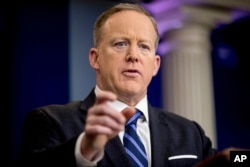In the face of international outrage, U.S. President Donald Trump's spokesman says the decision to invite authoritarian Philippine President Rodrigo Duterte and other East Asian leaders to the White House is part of a strategy to isolate North Korea.
"It is an opportunity to work with countries in that region who can help play a role in diplomatically and economically isolating North Korea," said White House spokesman Sean Spicer on Monday. "And, frankly, the national interests of the United States, the safety of our people and the safety of people in the region are the number one priorities of the president."
In telephone conversations over the weekend, Trump invited the leaders of Thailand, Singapore and the Philippines to visit. But it was the invitation to the firebrand Duterte that touched off shock waves on Capitol Hill and infuriated the global human rights community.
Invitation questioned
"President Trump weakens American values when he fails to stand up for human rights," said Sen. Chris Coons, a Democrat from Delaware, in a written statement. "President Duterte has overseen the illegal killing of thousands of his own people in the Philippines. By welcoming Duterte to meet with him at the White House, Trump risks giving Duterte's actions and his brutal human rights violations an American stamp of approval."
"It sends a terrible message to the world," said John Sifton, Asia advocacy director of Human Rights Watch.
Duterte has been scorned internationally for his war on drugs, which has featured the extrajudicial killings of thousands of people. He is reported to have bragged to British media that he personally killed three suspects while he was mayor of the southern city of Davao.
Jonah Blank, Asia analyst at the Rand Corporation, noted that even some White House and State Department staff were caught off guard at news of the Duterte invitation. "It's a balancing of the values America has stood for under both Democratic and Republican administrations, versus a desire to have warmer relations with problematic leaders," Blank told VOA.
Trump isn’t concerned
Trump brushed off concerns about Duterte's reputation in an interview Monday with Bloomberg News. "The Philippines is very important to me strategically and militarily," the president said. "I look forward to meeting him. If he comes to the White House, that's fine."
The invitation to Duterte raised questions Monday at the White House about whether Trump had been fully briefed on the Philippine president's human rights record. "The president gets fully briefed on the leaders he's speaking to," Spicer said. "But the number one concern of the president is to make sure we do everything we can to protect our people."
Trump even mused to Bloomberg that he might be willing to invite North Korean leader Kim Jong Un to the White House. Spicer, however, clarified that such an invitation could only come if circumstances change in North Korea.
"Under the right circumstances was, I believe, the phrase used," Spicer said. "We've got to see their provocative behavior ratchet down immediately. There's a lot of conditions that I think would have to happen with respect to its behavior and — to show signs of good faith. Clearly conditions are not there right now."
Not so fast
Duterte on Monday seemed in no hurry to accept the White House invitation. He told reporters in Manila, "I cannot make any definite promises," noting that he already is scheduled to visit Russia and Israel in the coming months.
Duterte also said he told Trump that military threats are not the best tactic for dealing with North Korea.
"I said, mister president, I do not think that you can scare Kim Jung Un with the fire power. Our greatest chance of getting some dialogue with America and North Korea would be through the intercession of China," Duterte said.
Regional analysts Monday questioned the role the Philippines might be able to play in any effort to put military pressure on Pyongyang.
The Philippines could provide diplomatic support for the U.S. position on North Korea, but not much else, said Malcolm Cook, senior fellow at the ISEAS-Yusof Ishak Institute in Singapore. "U.S. forces in Japan and South Korea, and Japan's own self-defense forces, are key. The Philippines is far away and is not a node in the U.S. ballistic missile defense system."






